By Joel Blechman, FamilyFarmed
When I tell people I’m the director of the Good Food Business Accelerator, which FamilyFarmed launched last fall, I’m frequently asked, “What does that mean?”
Accelerators — which provide mentorship, networking opportunities, and other assistance to promising entrepreneurial businesses — compose a fast-rising sector that is promoting economic development in the United States and around the world, but that phenomenon is still fairly new to a lot of people. And most accelerators are focused on the tech world, so the concept of an accelerator program focused on food, no less start-up businesses in the Good Food movement, is an even less-familiar concept.
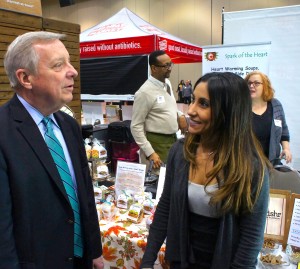
Illinois U.S. Sen. Dick Durbin chatted with Good Food Business Accelerator Fellow Rowida Assalimy — producer of Kishr, a hot beverage — at FamilyFarmed’s Good Food Festival & Conference. Thomas Frierson and Cynthia Zeki of Spark of the Heart, another Accelerator Fellow business, look on.
I usually begin by explaining the concept of Good Food. By the time I’m done talking about food grown locally using sustainable, humane, and fair practices, I usually have their attention.
Then I explain that FamilyFarmed determined that the Business Accelerator is the best way to accomplish our goal of increasing the supply of Good Food to the region around Chicago, where our nonprofit organization is based and focuses much of its attentions.
In short, we work with early-stage companies and/or companies with expansion ideas in the early stage. We help them to prepare to scale up by providing them resources, contacts, and curriculum that allow them to create and polish their business plans, market development plans, funding plans, and presentations to potential funders.
The nine competitively selected Fellows in the first class of the Good Food Business Accelerator — who you will meet below — have made great progress since their program activities started in December. And their skills, and incredible personal stories, will be on display at the Good Food Business Accelerator Demo Day @ 1871, which takes place Monday, April 27 beginning at 6 p.m.
Click HERE to register and purchase your tickets, but please hurry so you don’t miss out, because we expect this event to sell out quickly.
Demo Day takes place at the 1871 business incubator, the dynamic center for technology and innovation in Chicago where the Good Food Business Accelerator program is located. Situated on the 12th floor of the historic Merchandise Mart building, 1871 was an inspired choice for our location. It not only provides a great centralized location at which our Fellows from all over the state of Illinois congregate on curriculum days, but also gives them access to a broad range of investor, tech, and entrepreneurial expertise.
These benefits add to FamilyFarmed’s extensive network of food industry professionals, investors, and entrepreneurs to provide the ‘secret sauce’ that helps our Fellows achieve their objectives. In addition, each Fellow is paired with a Super Mentor from our network who uses his or her own experience and business success to work individually to guide them and help identify the resources necessary for them to complete their Accelerator program expectations.
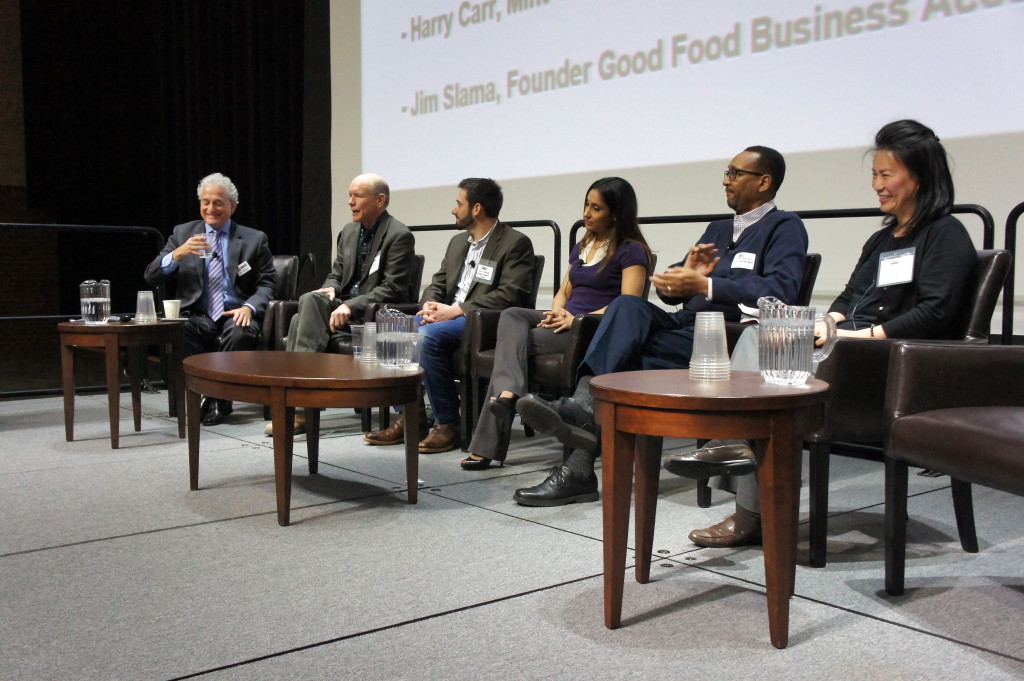
Fellows in the Good Food Business Accelerator on March 19 at FamilyFarmed’s Good Food Festival & Conference. From left, Jim Slama, president of FamilyFarmed; Harry Carr of Mint Creek Farm; Nik Jacobs of Jacobs Bros. Farms; Rowida Assalimy of Ro’s Beverages; Thomas Frierson of Spark of the Heart; and Jenny Yang of Phoenix Tofu
Off To A Great Start
All of the Fellows have made significant progress through their Good Food Business Accelerator Experience. Here’s a brief review, and also a preview of the stories you’ll hear when you attend our Demo Day. (To read about the Accelerator Fellows’ participation and presentations at FamilyFarmed’s recent Good Food Festival & Conference, click here.)
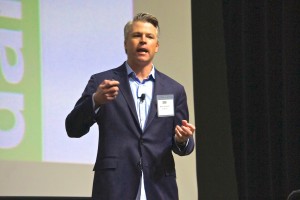
Good Food Business Accelerator Fellow Shane Christensen of dailyServing pitches his business plan at the Good Food Festival & Conference.
Shane Christensen, dailyServing, Chicago
Shane Christensen is a veteran entrepreneur, but had no previous experience in the food industry before starting dailyServing, which provides a line of conveniently packaged functional food snacks aimed at addressing the nutritional needs of various daily activities for today’s busy lifestyles. In the past several months, Shane has reformulated his product mix to focus on organic, sustainable ingredients, he has revised his packaging to reflect the realities of the retail environment, and made contacts through the Good Food Business Accelerator that will enable him to fill his sales pipeline for the foreseeable future. (Click here to read a profile of Shane Christensen published previously on Good Food on Every Table.)
Rowida Assalimy, Kishr, Chicago
Rowida Assalimy is the daughter of immigrants from Yemen and grew up enjoying a hot beverage called Qishr that is a familiar part of that nation’s culture. She believed that American consumers would enjoy its rich flavor and the fact that the main ingredient, the coffee cherry, is rich in antioxidants. Since joining the Accelerator, Ro has redesigned her packaging, rebranding for a more powerful presence on retail shelves; explored sourcing partnerships that can expedite her growth; and landed her product on significantly more store shelves. She has also honed her pitch to potential funders.
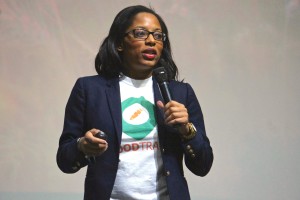
Good Food Business Accelerator Fellow Riana Lynn of FoodTrace pitches her business plan at the Good Food Festival & Conference.
Riana Lynn, FoodTrace, Chicago
Riana Lynn turned the sourcing issues she faced at her previous business, a popular juice bar chain, into an intriguing business proposition. What if there was a way to connect local farms with restaurants and retailers, which would help farmers find buyers for their produce and allow restaurateurs and retailers to source the products, all while providing the traceability for product sourcing that their customers demand? Out of this came FoodTrace, a technology platform designed to address these issues. Since joining the Accelerator, Riana has made great progress clarifying her business proposition, building out her beta platform for testing, and gaining significant visibility for her company. Her efforts are already being rewarded: At the recent South by Southwest Conference in Austin, Texas, Riana was selected by Google and Code2040 — a nonprofit devoted to creating opportunities for African American and Hispanic engineers — to be a part of their first class of Entrepreneurs in Residence. This will provide her with workspace (coincidentally also at 1871) and a stipend to continue to scale up her company.
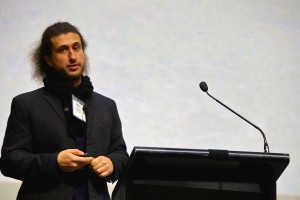
Good Food Business Accelerator Fellow Alex Poltorak of Urban Canopy pitches his business plan at the Good Food Festival & Conference.
Alex Poltorak and Alberto Rincón, Urban Canopy, Chicago
Alex Poltorak (the founder of Urban Canopy), Alberto Rincón, and their team of innovators have been bringing Good Food to underserved populations in Chicago, as well as pioneering products and food-related services to positively benefit Chicago more broadly. They’ve turned parking lots into farms, run farmers markets for the City of Chicago, provide organically grown microgreens to local restaurants and juice bars, and through their Compost Club, intend to close the circle to minimize food waste. Through their Accelerator experience, they have had the opportunity to closely examine their business model, and in so doing discovered an opportunity to dramatically scale up the Compost Club to serve an ever-larger part of the Chicago community.
Jenny Yang, Phoenix Tofu, Chicago
Jenny Yang has successfully managed her Phoenix Bean tofu and soy product company over the past seven years. Since joining the Accelerator, she has focused on identifying key growth areas for Phoenix Bean, particularly through value-added products such as ready-to-eat tofu salads, assessing the need for a new production facility to improve efficiencies and provide room for expansion, and increasing her retail presence through a new relationship with Whole Foods Market. (Click here to read a profile of Jenny Yang published previously on Good Food on Every Table.)
Thomas Frierson and Cynthia Zeki , Spark of The Heart, Chicago
The married couple of Thomas Frierson and Cynthia Zeki have been building their homespun business based on Cynthia’s delicious recipes for dried bean based soups and salads. Since joining the Accelerator, they have made contact with retailers who have expressed interest marketing their products. Through an examination of their current practices, they have realized the need to reimagine their packaging, branding, and production practices in order to meet this increased demand, and have been exploring each of these areas to prepare to scale up.
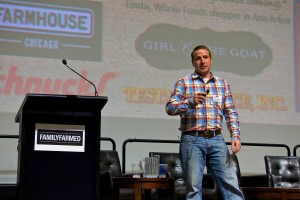
Good Food Business Accelerator Fellow Mark Schneider of Living Water Farms pitches his business plan at the Good Food Festival & Conference.
Mark Schneider, Living Water Farms, Strawn, Illinois
Mark Schneider and his family run a sustainable indoor family farm located in the heart of Illinois farmland that grows the highest-quality specialty greens and microgreens year round in greenhouses for top chefs, select distributors, and local retailers throughout the Midwest. Currently a small operation, Living Water Farms has identified an opportunity to expand into a 160,000 square-foot greenhouse, automate, and significantly expand production. Through the Accelerator, Schneider and his colleagues have worked on their business plan, product mix, financing alternatives, and potential partners that will allow them to achieve their dream. (Click here to read a profile of Mark Schneider published previously on Good Food on Every Table.)
Nik Jakobs, Jakobs Brothers Farms, Sterling, Illinois
Nik Jakobs is a third-generation farmer in his family’s 8,000-head conventional beef finishing operation. He looked beyond the horizon and envisioned the future for him and his growing family, and determined that future is to move toward sustainable methods. Through the Accelerator, Nik has explored potential new markets for sustainable beef, as well as identifying the hurdles the operation faces in terms of processing, regulatory issues, and land management. Nik believes that through this experience, Jakobs Brothers will eventually emerge as one of the industry’s leaders in the transition to sustainable practices.
Harry Carr, Mint Creek Farm, Stelle, Illinois
Harry Carr and his family have built a business combining their passion to preserve and rebuild the prairie with providing top-quality, sustainably produced, pasture-raised beef, pork, sheep, and poultry to the local and regional market. Through the Accelerator, they have re-envisioned their product mix and marketing strategy to maximize margins, and have been connected with potential funders who would allow them to scale up to meet the existing demand for their products.
We hope you join us at the Good Food Business Accelerator Demo Day @1871 to learn more about each of these impressive businesses.
